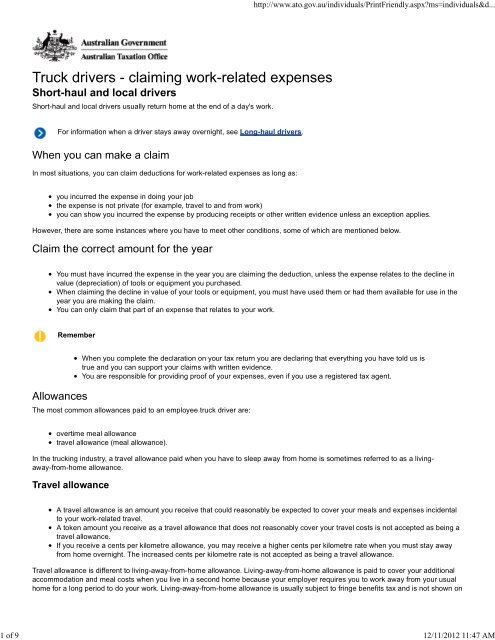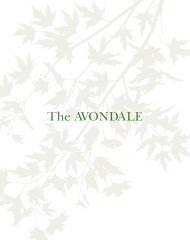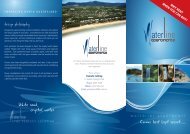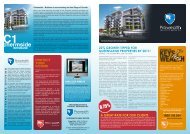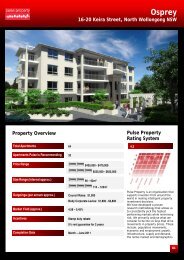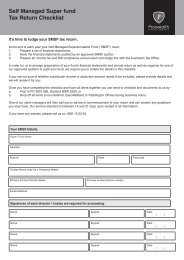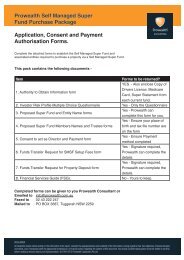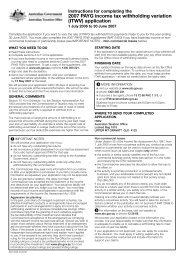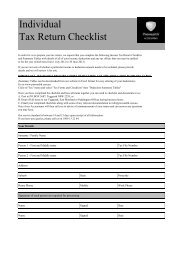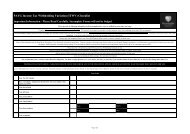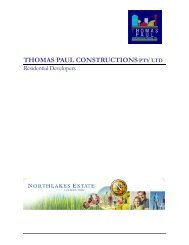Truck drivers - claiming work-related expenses - Prowealth
Truck drivers - claiming work-related expenses - Prowealth
Truck drivers - claiming work-related expenses - Prowealth
You also want an ePaper? Increase the reach of your titles
YUMPU automatically turns print PDFs into web optimized ePapers that Google loves.
http://www.ato.gov.au/individuals/PrintFriendly.aspx?ms=individuals&d...<br />
1 of 9 12/11/2012 11:47 AM<br />
<strong>Truck</strong> <strong>drivers</strong> - <strong>claiming</strong> <strong>work</strong>-<strong>related</strong> <strong>expenses</strong><br />
Short-haul and local <strong>drivers</strong><br />
Short-haul and local <strong>drivers</strong> usually return home at the end of a day's <strong>work</strong>.<br />
For information when a driver stays away overnight, see Long-haul <strong>drivers</strong>.<br />
When you can make a claim<br />
In most situations, you can claim deductions for <strong>work</strong>-<strong>related</strong> <strong>expenses</strong> as long as:<br />
you incurred the expense in doing your job<br />
the expense is not private (for example, travel to and from <strong>work</strong>)<br />
you can show you incurred the expense by producing receipts or other written evidence unless an exception applies.<br />
However, there are some instances where you have to meet other conditions, some of which are mentioned below.<br />
Claim the correct amount for the year<br />
You must have incurred the expense in the year you are <strong>claiming</strong> the deduction, unless the expense relates to the decline in<br />
value (depreciation) of tools or equipment you purchased.<br />
When <strong>claiming</strong> the decline in value of your tools or equipment, you must have used them or had them available for use in the<br />
year you are making the claim.<br />
You can only claim that part of an expense that relates to your <strong>work</strong>.<br />
Remember<br />
Allowances<br />
When you complete the declaration on your tax return you are declaring that everything you have told us is<br />
true and you can support your claims with written evidence.<br />
You are responsible for providing proof of your <strong>expenses</strong>, even if you use a registered tax agent.<br />
The most common allowances paid to an employee truck driver are:<br />
overtime meal allowance<br />
travel allowance (meal allowance).<br />
In the trucking industry, a travel allowance paid when you have to sleep away from home is sometimes referred to as a livingaway-from-home<br />
allowance.<br />
Travel allowance<br />
A travel allowance is an amount you receive that could reasonably be expected to cover your meals and <strong>expenses</strong> incidental<br />
to your <strong>work</strong>-<strong>related</strong> travel.<br />
A token amount you receive as a travel allowance that does not reasonably cover your travel costs is not accepted as being a<br />
travel allowance.<br />
If you receive a cents per kilometre allowance, you may receive a higher cents per kilometre rate when you must stay away<br />
from home overnight. The increased cents per kilometre rate is not accepted as being a travel allowance.<br />
Travel allowance is different to living-away-from-home allowance. Living-away-from-home allowance is paid to cover your additional<br />
accommodation and meal costs when you live in a second home because your employer requires you to <strong>work</strong> away from your usual<br />
home for a long period to do your <strong>work</strong>. Living-away-from-home allowance is usually subject to fringe benefits tax and is not shown on
http://www.ato.gov.au/individuals/PrintFriendly.aspx?ms=individuals&d...<br />
2 of 9 12/11/2012 11:47 AM<br />
your payment summary.<br />
If your living-away-from-home allowance appears on your payment summary and is paid to you to cover meal <strong>expenses</strong> because you<br />
have to sleep away from home, you should treat it as a travel allowance.<br />
Regardless of how much allowance you receive, you can only claim a deduction for the <strong>expenses</strong> you paid. That is, if you paid $80 in<br />
<strong>work</strong>-<strong>related</strong> <strong>expenses</strong> and you received a $100 allowance for those <strong>expenses</strong>, you can claim only $80.<br />
If you are <strong>claiming</strong> travel <strong>expenses</strong> and you received a travel allowance from your employer, you<br />
must record the allowance as income on your tax return at item 2.<br />
Reimbursements<br />
Example 1<br />
If your employer or any other person reimburses you for <strong>expenses</strong> you have actually incurred, the payment is called a<br />
reimbursement. An allowance is not considered to be a reimbursement.<br />
You cannot claim a deduction for <strong>expenses</strong> you incur if those <strong>expenses</strong> are reimbursed to you by your employer - you do not<br />
include a reimbursement on your tax return.<br />
If you claim your motor vehicle <strong>expenses</strong> from your employer using the cents per kilometre method, the amount you receive is<br />
considered to be an allowance.<br />
Troy had to use his car to meet another truck driver who had to stop driving his truck 20kms away from the depot due to a<br />
mandatory long break. The driver returned Troy's car to the depot while Troy drove the truck.<br />
Troy was paid for the 20 kilometres he used his car based on the cents per kilometre rate plus the bridge toll he incurred.<br />
Even though Troy received a payment for using his car, the payment is not a reimbursement but an allowance, as it is only an<br />
estimate of the cost of using the car. Therefore, Troy must show the amount he received on his tax return at item 2.<br />
The amount Troy receives from his employer to cover the cost of the bridge toll is a reimbursement, and does not have to be<br />
included on Troy's tax return.<br />
Troy can claim a deduction for these car <strong>expenses</strong> at item D1 Work-<strong>related</strong> car <strong>expenses</strong> on his tax return.<br />
Evidence to support your claims<br />
If your total claims add up to more than $300 (excluding claims for car, meal allowance, award transport payments allowance and<br />
travel allowance <strong>expenses</strong>), you must keep written evidence, such as receipts. Your written evidence must show you incurred the full<br />
amount of your claim, not just the amount over the first $300.<br />
If the total amount you are <strong>claiming</strong> is $300 or less, you do not need to keep receipts, but you must be able to show how you <strong>work</strong>ed<br />
out your claims.<br />
Claiming overtime meal <strong>expenses</strong><br />
Generally meals, snacks and drinks you buy and consume while on the job are considered to be a private expense for which you<br />
cannot claim a deduction.<br />
If you stay away overnight, you can claim a deduction for your meal <strong>expenses</strong> - see Claiming meal and<br />
incidental <strong>expenses</strong>.<br />
If you are <strong>work</strong>ing overtime, you can claim a deduction for overtime meal <strong>expenses</strong> if you:<br />
purchased a meal when you <strong>work</strong>ed overtime, and<br />
received an overtime meal allowance under an industrial award for <strong>work</strong>ing overtime.<br />
You must include the allowance you receive on your tax return if you:<br />
have an overtime meal allowance shown on your payment summary<br />
are <strong>claiming</strong> a deduction that is different from the allowance amount and the allowance is not shown on your payment<br />
summary, or<br />
received an allowance in excess of the reasonable allowance amount.
http://www.ato.gov.au/individuals/PrintFriendly.aspx?ms=individuals&d...<br />
3 of 9 12/11/2012 11:47 AM<br />
Most industrial awards roll the overtime meal allowance into the normal salary or wage and it is not included as a separate allowance<br />
on your payment summary. In this situation, you cannot claim a deduction for overtime meals.<br />
We set the reasonable allowance amount for your circumstances in an annual taxation determination, which explains:<br />
when you don't need evidence of your <strong>expenses</strong><br />
the way in which you can claim them.<br />
For the 2009-10 reasonable allowance amount, refer to Taxation Determination TD 2009/15 -<br />
Income tax: what are the reasonable travel and overtime meal allowance expense amounts<br />
for 2009-10 income year?<br />
For the 2010-11 reasonable allowance amounts, refer to TD 2011/17 - Income tax: what are the<br />
reasonable travel and overtime meal allowance expense amounts for the 2011-12 income<br />
year? (as at 30 June 2010).<br />
If the overtime meal allowance is not shown on your payment summary and was not more than the reasonable allowance amount,<br />
you do not have to show it on your tax return as long as you:<br />
spent the entire allowance on <strong>expenses</strong> for which you can claim a deduction, and<br />
are not <strong>claiming</strong> the deduction.<br />
You claim overtime meal <strong>expenses</strong> at item D5 Other <strong>work</strong>-<strong>related</strong> <strong>expenses</strong> on your tax return.<br />
Keeping records of your overtime meal <strong>expenses</strong><br />
You must keep records and these can be:<br />
receipts, or other written evidence of your <strong>expenses</strong>, including receipts for depreciating assets you have purchased<br />
diary entries you make to record your small <strong>expenses</strong> ($10 or less) totalling no more than $200, or <strong>expenses</strong> you cannot get<br />
any kind of evidence for, regardless of the amount<br />
payment summaries showing items such as overtime meal allowances<br />
pay slips which record allowances<br />
a letter from your employer recording your allowances.<br />
Long-haul <strong>drivers</strong><br />
A long-haul driver is a driver who usually sleeps away from home in the course of driving the truck.<br />
When you can make a claim<br />
In most situations, you can claim deductions for <strong>work</strong>-<strong>related</strong> <strong>expenses</strong> as long as:<br />
you incurred the expense in doing your job<br />
the expense is not private (for example, travel to and from <strong>work</strong>), and<br />
you can show you incurred the expense by producing receipts or other written evidence unless an exception applies.<br />
However, there are some instances where you have to meet other conditions, some of which are mentioned below.<br />
Claim the correct amount for the year<br />
You must have incurred the expense in the year you are <strong>claiming</strong> the deduction, unless the expense relates to the decline in<br />
value (depreciation) of tools or equipment you purchased.<br />
When <strong>claiming</strong> the decline in value of your tools or equipment, you must have used them or had them available for use in the<br />
year you are making the claim.<br />
You can only claim that part of an expense that relates to your <strong>work</strong>.
http://www.ato.gov.au/individuals/PrintFriendly.aspx?ms=individuals&d...<br />
4 of 9 12/11/2012 11:47 AM<br />
Remember<br />
Allowances<br />
When you complete the declaration on your tax return you are declaring that everything you have told us is<br />
true and you can support your claims with written evidence.<br />
You are responsible for providing proof of your <strong>expenses</strong>, even if you use a registered tax agent.<br />
The most common allowances paid to an employee truck driver are:<br />
overtime meal allowance<br />
travel allowance (meal allowance).<br />
In the trucking industry, a travel allowance paid when you have to sleep away from home is sometimes referred to as a livingaway-from-home<br />
allowance.<br />
Travel allowance<br />
A travel allowance is an amount you receive that could reasonably be expected to cover your meals and <strong>expenses</strong> incidental<br />
to your <strong>work</strong>-<strong>related</strong> travel.<br />
A token amount you receive as a travel allowance that does not reasonably cover your travel costs is not accepted as being a<br />
travel allowance.<br />
If you receive a cents per kilometre allowance, you may receive a higher cents per kilometre rate when you must stay away<br />
from home overnight. The increased cents per kilometre rate is not accepted as being a travel allowance.<br />
Travel allowance is different to living-away-from-home allowance. Living-away-from-home allowance is paid to cover your additional<br />
accommodation and meal costs when you live in a second home because your employer requires you to <strong>work</strong> away from your usual<br />
home for a long period to do your <strong>work</strong>. Living-away-from-home allowance is usually subject to fringe benefits tax and is not shown on<br />
your payment summary.<br />
If your living-away-from-home allowance appears on your payment summary and is paid to you to cover meal <strong>expenses</strong> because you<br />
have to sleep away from home, you should treat it as a travel allowance.<br />
Regardless of how much allowance you receive, you can claim only a deduction for the <strong>expenses</strong> you paid. That is, if you paid $80 in<br />
<strong>work</strong>-<strong>related</strong> <strong>expenses</strong> and you received a $100 allowance for those <strong>expenses</strong>, you can claim only $80.<br />
If you are <strong>claiming</strong> travel <strong>expenses</strong> and you received a travel allowance from your employer, you<br />
must record the allowance as income on your tax return at item 2.<br />
Reimbursements<br />
Example 2<br />
If your employer or any other person reimburses you for <strong>expenses</strong> you have actually incurred, the payment is called a<br />
reimbursement. An allowance is not considered to be a reimbursement.<br />
You cannot claim a deduction for <strong>expenses</strong> you incur if those <strong>expenses</strong> are reimbursed to you by your employer - you do not<br />
include a reimbursement on your tax return.<br />
An allowance is not considered to be a reimbursement.<br />
If you claim your motor vehicle <strong>expenses</strong> from your employer using the cents per kilometre method, the amount you receive is<br />
considered to be an allowance.<br />
Troy had to use his car to meet another truck driver who had to stop driving his truck 20km away from the depot due to a<br />
mandatory long break. The driver returned Troy's car to the depot while Troy drove the truck.<br />
Troy was paid for the 20 kilometres he used his car based on the cents per kilometre rate plus the bridge toll he incurred.<br />
Even though Troy received a payment for using his car, the payment is not a reimbursement but an allowance, as it is only an<br />
estimate of the cost of using the car. Therefore, Troy must show the amount he received on his tax return at item 2.<br />
The amount Troy receives from his employer to cover the cost of the bridge toll is a reimbursement, and does not have to be<br />
included on Troy's tax return.
http://www.ato.gov.au/individuals/PrintFriendly.aspx?ms=individuals&d...<br />
5 of 9 12/11/2012 11:47 AM<br />
Troy can claim a deduction for these car <strong>expenses</strong> at item D1 <strong>work</strong>-<strong>related</strong> car <strong>expenses</strong> on his tax return.<br />
Evidence to support your claims<br />
If your total claims add up to more than $300 (excluding claims for car, meal allowance, award transport payments allowance and<br />
travel allowance <strong>expenses</strong>), you must keep written evidence, such as receipts. Your written evidence must show you incurred the full<br />
amount of your claim, not just the amount over the first $300.<br />
If the total amount you are <strong>claiming</strong> is $300 or less, you do not need to keep receipts, but you must be able to show how you <strong>work</strong>ed<br />
out your claims.<br />
Claiming <strong>work</strong>-<strong>related</strong> car <strong>expenses</strong><br />
Transporting bulky tools and equipment<br />
You can claim a deduction for the cost of transporting bulky tools and equipment between home and <strong>work</strong> if:<br />
Example 3<br />
you need to use them at <strong>work</strong>, and<br />
there is no secure area for storing them at your <strong>work</strong>place.<br />
Amy does an intercity haul. She collects her loaded truck in the evening and travels overnight to another city which she<br />
reaches before her mandatory long break. She unhitches the trailer, takes the truck to a place where she can sleep in it and<br />
then returns to collect the reloaded trailer for the return trip that night.<br />
Amy takes a portable fridge, two screw<strong>drivers</strong>, food for the road, a sleeping bag, a blanket, a change of clothing, toiletry gear<br />
and a GPS with her. She keeps these items at home and transports them to and from her depot as there is no storage at the<br />
depot. The items she uses for <strong>work</strong> are considered bulky.<br />
Amy is entitled to a deduction for her costs of travelling between her home and depot.<br />
For more information about <strong>claiming</strong> deductions for your car <strong>expenses</strong> refer to Work-<strong>related</strong> car <strong>expenses</strong>.<br />
Claiming meal and incidental <strong>expenses</strong><br />
When you must stay away from home in the course of doing your job, you may be able to claim a deduction for your:<br />
Example 4<br />
meal <strong>expenses</strong><br />
incidental <strong>expenses</strong>.<br />
Joe does an intercity haul. He travels to a sleepover point where he hands the truck over to another driver and takes his<br />
required break at the company-paid accommodation. He then collects a truck going back home. Joe receives a meal<br />
allowance to cover his meals while on the road and for the sleepover.<br />
Joe can claim the costs of his meals and incidental <strong>expenses</strong> because he incurred them as a result of having to stay away<br />
from home.<br />
Example 5<br />
Meredith is a truck driver. She regularly has to drive her truck to a distant country depot. Because the depot is so far away, she<br />
sleeps in the cab of the truck overnight and she also incurs meal <strong>expenses</strong> while on the road. As Meredith slept in the cab of<br />
her truck, she cannot claim a deduction for her accommodation <strong>expenses</strong> because she didn't incur any. Meredith can claim a<br />
deduction for the cost of buying her meals while on the road.<br />
Generally, you will not incur accommodation <strong>expenses</strong> when <strong>work</strong>ing because you sleep in your truck or in accommodation provided
http://www.ato.gov.au/individuals/PrintFriendly.aspx?ms=individuals&d...<br />
6 of 9 12/11/2012 11:47 AM<br />
by your employer. This means you cannot claim a deduction for your accommodation, as you did not incur an expense.<br />
If you are <strong>claiming</strong> travel <strong>expenses</strong> and you received a travel allowance from your employer, you<br />
must record the allowance as income at item 2 on your tax return.<br />
For more information about <strong>claiming</strong> deductions for your meal and incidental <strong>expenses</strong>, refer to<br />
Work-<strong>related</strong> travel <strong>expenses</strong>.<br />
When you cannot make a claim<br />
Generally if your travel did not involve an overnight stay you cannot claim meals, even if you received a travel allowance.<br />
Example 6<br />
Matthew is a truck driver who transports a load of cement from Sydney to Canberra and then returns to his base in Sydney the<br />
same day. He buys food and drink during the course of the trip. As Matthew will return home to sleep, he cannot claim a<br />
deduction for the food and drink he bought while on the road, even if his employer paid him a travel allowance.<br />
Keeping records of your meal and incidental <strong>expenses</strong><br />
You can claim a deduction for the full amount of your meal and incidental <strong>expenses</strong> without keeping all your records if:<br />
you receive a travel allowance that could reasonably be expected to cover your meals and <strong>expenses</strong> incidental to the travel (a<br />
token amount you receive as a travel allowance is not accepted as reasonably covering such costs), and<br />
your meal and incidental <strong>expenses</strong> are equal to or less than the reasonable allowance amount.<br />
However, we may ask you to explain how you <strong>work</strong>ed out the amount you claimed.<br />
We set the reasonable allowance amount for your circumstances in an annual taxation determination that explains:<br />
when you don't need evidence of your <strong>expenses</strong><br />
the way in which you can claim them.<br />
For the 2009-10 reasonable allowance amount, refer to Taxation Determination TD 2009/15 -<br />
Income tax: what are the reasonable travel and overtime meal allowance expense amounts<br />
for 2009-10 income year?<br />
For the 2010-11 reasonable allowance amounts, refer to TD 2011/17 - Income tax: what are the<br />
reasonable travel and overtime meal allowance expense amounts for the 2011-12 income<br />
year? (as at 30 June 2010).<br />
Many truck <strong>drivers</strong> do not receive a travel allowance and will have to keep records of their meal and incidental <strong>expenses</strong> to support<br />
their claims.<br />
You claim your travel <strong>expenses</strong> at item D2 Work-<strong>related</strong> travel <strong>expenses</strong> on your tax return.<br />
Types of records<br />
Written evidence<br />
Written evidence can be:<br />
invoices, receipts or other documents showing your travel expense and travel allowance details. If it is too difficult to get a<br />
receipt for a meal you purchased - for example, if you purchase a meal from a vending machine - you can keep diary entries<br />
as your proof of purchase<br />
receipts or other documents (such as diary entries) for air, bus, train, tram and taxi fares, bridge and road tolls, parking and car<br />
hire fees.
http://www.ato.gov.au/individuals/PrintFriendly.aspx?ms=individuals&d...<br />
7 of 9 12/11/2012 11:47 AM<br />
Travel diary<br />
A travel diary is a document that shows the dates, places, times and duration of your activities and travel. Each diary entry must show<br />
the date you incurred each expense, the name of the supplier and the amount and type of expense.<br />
Example 7<br />
Steve is a truck driver who must transport goods to other states. His trips keep him away from home for several days at a<br />
time. While on the road Steve normally has a cooked breakfast and a substantial evening meal at a roadhouse. For lunch,<br />
Steve buys drinks and snacks from vendors who do not supply receipts.<br />
Steve should obtain receipts for his breakfasts and evening meals as it is easy for him to do so from the roadhouses at which<br />
he eats. However, Steve can make diary entries for his lunch <strong>expenses</strong> as it is difficult for him to obtain receipts from the<br />
vendors.<br />
If you received a travel allowance and your claim does not exceed the reasonable<br />
allowance amount<br />
You do not have to show the travel allowance on your tax return if you:<br />
spent the entire allowance on your meals, and<br />
are not <strong>claiming</strong> a deduction for the meals.<br />
Otherwise, you must show the allowance on your return.<br />
If you receive a travel allowance and your claim does not exceed the reasonable allowance amount, you do not have to keep records<br />
of your <strong>expenses</strong>.<br />
Example 8<br />
Connor drives trucks for a busy company. Because he mainly drives long distance trips, he spends about 208 days away from<br />
home each income year. He also receives a travel allowance from his employer that reasonably covers the expected cost of<br />
his meals and other incidentals. However, since he sleeps in the cab of his truck, he doesn't receive any allowance for<br />
accommodation <strong>expenses</strong>.<br />
Connor spends more than his travel allowance allows, but less than the reasonable allowance amount. Because of this,<br />
Connor can claim a deduction for meal <strong>expenses</strong> he incurred without keeping records of those <strong>expenses</strong>. However, he cannot<br />
claim any accommodation <strong>expenses</strong> because he didn't incur any.<br />
Example 9<br />
Dennis travels from Adelaide to Mt Gambier to deliver some freight that just arrived from China. He is away from home for one<br />
night. His employer pays him a travel allowance for meals and incidentals.<br />
The travel allowance Dennis receives is less than the reasonable allowance amount but is likely to cover his expected costs.<br />
Dennis spends all of the allowance on his <strong>expenses</strong>. The allowance was not shown on Dennis' payment summary.<br />
As Dennis spends the entire allowance on <strong>expenses</strong> for which he is eligible to claim a deduction, he does not have to show<br />
the allowance on his tax return if he doesn't claim the deduction.<br />
If you received a travel allowance and your claim exceeds the reasonable allowance<br />
amount<br />
The following table explains the records you must keep when you receive a travel allowance and your claim exceeds the reasonable<br />
allowance amount.<br />
Domestic travel
http://www.ato.gov.au/individuals/PrintFriendly.aspx?ms=individuals&d...<br />
8 of 9 12/11/2012 11:47 AM<br />
Written evidence<br />
Travel diary<br />
Travel less than 6 nights in a row Yes No<br />
Travel 6 or more nights in a row Yes Yes<br />
Example 10<br />
If the amount you are <strong>claiming</strong> exceeds the reasonable allowance amount, you must keep records to show the full<br />
amount of your claim, not just the amount over the limit.<br />
Brenda travels from Adelaide to Broken Hill to deliver some freight that just arrived from China. She is away from home for two<br />
nights. Her employer pays a travel allowance for meals and incidentals.<br />
The travel allowance Brenda receives is more than the reasonable allowance amount. Brenda spends all of the travel<br />
allowance on her <strong>expenses</strong>.<br />
Because the allowance Brenda receives is more than the reasonable allowance amount, she must include the allowance on<br />
her tax return. Brenda must keep receipts if she wants to claim more than the reasonable allowance amount.<br />
If your travel allowance is not shown on your payment summary<br />
The following table explains the records you must keep when you receive a travel allowance that is not shown on your payment<br />
summary and you are <strong>claiming</strong> a deduction for your meal and incidental travel <strong>expenses</strong>.<br />
Domestic travel<br />
Written evidence<br />
Travel diary<br />
Travel less than 6 nights in a row Yes No<br />
Travel 6 or more nights in a row Yes Yes<br />
These records include receipts or other documents showing the costs you incurred for meals and incidentals.<br />
Example 11<br />
Patrick's employer pays Patrick a cents per kilometre rate for the kilometres he travels for his <strong>work</strong> as an interstate truck<br />
driver. For overnight travel, his employer pays him a higher cents per kilometre rate.<br />
Because Patrick does not receive an allowance that could reasonably be expected to cover meals or <strong>expenses</strong> incidental to<br />
his travel, Patrick must keep records for all his <strong>expenses</strong>.<br />
If your trip is extended and you do not receive an allowance for the extra nights you are<br />
away for <strong>work</strong><br />
Example 12<br />
Andrew receives an allowance to cover his meals and incidentals for a three night trip. Due to bad weather, the roads are<br />
flooded and Andrew is away for a total of five nights. His employer does not pay an allowance or reimburse him for the extra<br />
two nights he is away for <strong>work</strong>.<br />
Because Andrew does not receive an allowance for the extra two nights he was out on the job, he can only claim a deduction<br />
for the extra <strong>expenses</strong> he incurs if he keeps records of the <strong>expenses</strong> that were not covered by his allowance.<br />
What to do/read next
http://www.ato.gov.au/individuals/PrintFriendly.aspx?ms=individuals&d...<br />
9 of 9 12/11/2012 11:47 AM<br />
For information about particular types of <strong>work</strong>-<strong>related</strong> <strong>expenses</strong>, refer to:<br />
Claiming deductions<br />
Work-<strong>related</strong> travel <strong>expenses</strong><br />
Other <strong>work</strong>-<strong>related</strong> <strong>expenses</strong><br />
Keeping your tax records<br />
<strong>Truck</strong> <strong>drivers</strong><br />
TD 2011/17 - Income tax: what are the reasonable travel and overtime meal allowance expense amounts for the<br />
2011-12 income year?<br />
Taxation Determination TD 2011/17 - Income tax: what are the reasonable travel and overtime meal allowance expense<br />
amounts for the 2011-12 income year?<br />
Taxation Determination TD 2009/15 - Income tax: what are the reasonable travel and overtime meal allowance<br />
expense amounts for 2009-10 income year?<br />
If you need help applying this information to your own situation, phone us on 13 28 61.<br />
Last Modified: Tuesday, 29 June 2010<br />
Our commitment to you<br />
We are committed to providing you with accurate, consistent and clear information to help you understand your rights and<br />
entitlements and meet your obligations.<br />
If you follow our information and it turns out to be incorrect, or it is misleading and you make a mistake as a result, we will take that<br />
into account when determining what action, if any, we should take.<br />
Some of the information on this website applies to a specific financial year. This is clearly marked. Make sure you have the<br />
information for the right year before making decisions based on that information.<br />
If you feel that our information does not fully cover your circumstances, or you are unsure how it applies to you, contact us or seek<br />
professional advice.<br />
Copyright<br />
© Australian Taxation Office for the Commonwealth of Australia<br />
You are free to copy, adapt, modify, transmit and distribute this material as you wish (but not in any way that suggests the ATO or the<br />
Commonwealth endorses you or any of your services or products).


